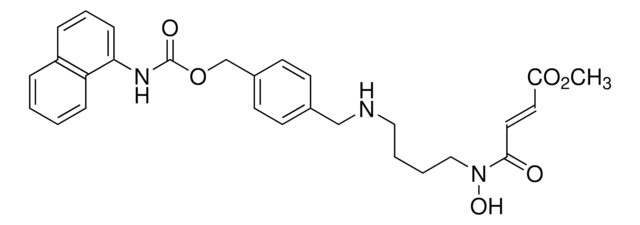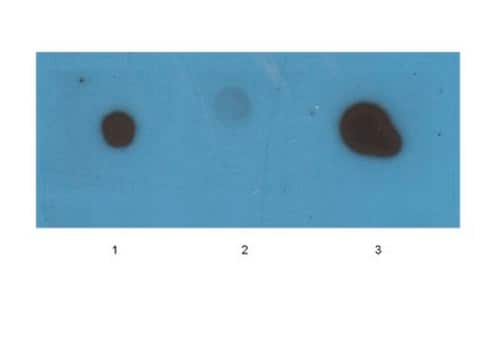Fontos dokumentumok
SML0741
ML324
≥98% (HPLC)
Szinonimák:
N-(3-(Dimethylamino)propyl)-4-(8-hydroxyquinolin-6-yl)benzamide
About This Item
Javasolt termékek
Minőségi szint
Teszt
≥98% (HPLC)
form
powder
tárolási körülmény
desiccated
szín
white to light brown
oldhatóság
DMSO: 10 mg/mL, clear
tárolási hőmérséklet
2-8°C
SMILES string
CN(C)CCCNC(C1=CC=C(C2=CC(O)=C(N=CC=C3)C3=C2)C=C1)=O
InChI
1S/C21H23N3O2/c1-24(2)12-4-11-23-21(26)16-8-6-15(7-9-16)18-13-17-5-3-10-22-20(17)19(25)14-18/h3,5-10,13-14,25H,4,11-12H2,1-2H3,(H,23,26)
Nemzetközi kémiai azonosító kulcs
QDBVSOZTVKXUES-UHFFFAOYSA-N
Biokémiai/fiziológiai hatások
Tulajdonságok és előnyök
Figyelmeztetés
Warning
Figyelmeztető mondatok
Óvintézkedésre vonatkozó mondatok
Veszélyességi osztályok
Acute Tox. 4 Oral
Tárolási osztály kódja
11 - Combustible Solids
WGK
WGK 3
Lobbanási pont (F)
Not applicable
Lobbanási pont (C)
Not applicable
Analitikai tanúsítványok (COA)
Analitikai tanúsítványok (COA) keresése a termék sarzs-/tételszámának megadásával. A sarzs- és tételszámok a termék címkéjén találhatók, a „Lot” vagy „Batch” szavak után.
Már rendelkezik ezzel a termékkel?
Az Ön által nemrégiben megvásárolt termékekre vonatkozó dokumentumokat a Dokumentumtárban találja.
Cikkek
We offer a variety of small molecule research tools, such as transcription factor modulators, inhibitors of chromatin modifying enzymes, and agonists/antagonists for target identification and validation in gene regulation research; a selection of these research tools is shown below.
Tudóscsoportunk valamennyi kutatási területen rendelkezik tapasztalattal, beleértve az élettudományt, az anyagtudományt, a kémiai szintézist, a kromatográfiát, az analitikát és még sok más területet.
Lépjen kapcsolatba a szaktanácsadással









